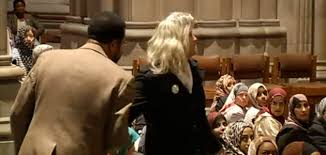But not everyone was happy to follow the example of tolerance and unity being set in the US capital.

One unidentified woman disrupted the first prayer service by shouting “leave our churches alone” and “why can’t you worship in your mosque” before being escorted out.
Franklin Graham also posted on Facebook the day before the service that it was “sad to see a church open its doors to the worship of anything other than the One True God of the Bible [sic]”.
According to the Washington Post, the faith event was organised by Muslim scholar and South African ambassador to the United States, Ebrahim Rasool, in partnership with Rev Canon Gina Gilland Campbell.
The pair had apparently developed the idea while working on a memorial service for Nelson Mandela.
Members of five Muslim communities joined the Friday prayer, also known as jumu'ah. It was closed to the public and had heavy security.

In his sermon Mr Rasool called on Muslims and Christians to unite and find a “common cause” in the fight against religious extremism, according to the newspaper.
“We come to this cathedral with sensitivity and humility but keenly aware that it is not a time for platitudes, because mischief is threatening the world,” he said.
"The challenge for us today is to reconstitute a middle ground of good people… whose very existence threatens extremism.”
Dan of the cathedral, the very Rev Gary Hall, commented on the sound of the Arabic call to prayer, saying it was a “beautiful sacred language in a beautiful sacred place”.
Speaking to the Post after the service, lawyer Arif Ali who brought his 12-year-old son Zayd with him, said he was “very moved”, adding: “It really makes one think about the common heritage and values in Christianity and Islam.”
Work began on building the Washington National Cathedral in 1907 and took 83 years to complete. It hosted the state funeral of President Eisenhower in 1969 and a year earlier saw the last Sunday sermon preached by Dr King just days before his death.

One unidentified woman disrupted the first prayer service by shouting “leave our churches alone” and “why can’t you worship in your mosque” before being escorted out.
Franklin Graham also posted on Facebook the day before the service that it was “sad to see a church open its doors to the worship of anything other than the One True God of the Bible [sic]”.
According to the Washington Post, the faith event was organised by Muslim scholar and South African ambassador to the United States, Ebrahim Rasool, in partnership with Rev Canon Gina Gilland Campbell.
The pair had apparently developed the idea while working on a memorial service for Nelson Mandela.
Members of five Muslim communities joined the Friday prayer, also known as jumu'ah. It was closed to the public and had heavy security.
In his sermon Mr Rasool called on Muslims and Christians to unite and find a “common cause” in the fight against religious extremism, according to the newspaper.
“We come to this cathedral with sensitivity and humility but keenly aware that it is not a time for platitudes, because mischief is threatening the world,” he said.
"The challenge for us today is to reconstitute a middle ground of good people… whose very existence threatens extremism.”
Dan of the cathedral, the very Rev Gary Hall, commented on the sound of the Arabic call to prayer, saying it was a “beautiful sacred language in a beautiful sacred place”.
Speaking to the Post after the service, lawyer Arif Ali who brought his 12-year-old son Zayd with him, said he was “very moved”, adding: “It really makes one think about the common heritage and values in Christianity and Islam.”
Work began on building the Washington National Cathedral in 1907 and took 83 years to complete. It hosted the state funeral of President Eisenhower in 1969 and a year earlier saw the last Sunday sermon preached by Dr King just days before his death.






No comments:
Post a Comment